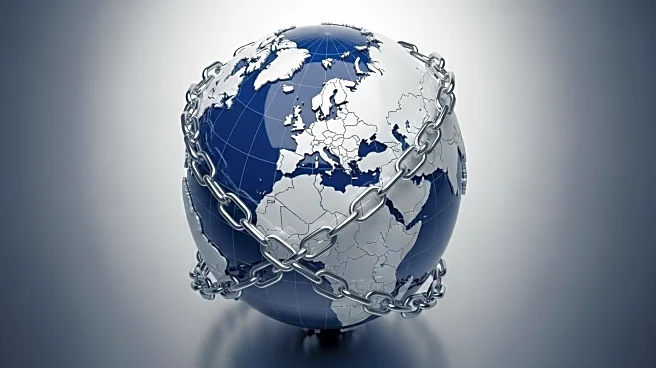What's Happening?
France, Germany, and the United Kingdom have reinstated United Nations sanctions on Iran, known as 'snapback' sanctions, due to Iran's failure to meet its commitments under the Joint Comprehensive Plan of Action (JCPOA). These sanctions, originally lifted as part of a deal to limit Iran's nuclear activities, have been reimposed as the European nations accused Iran of violating its obligations. The sanctions include an arms embargo and restrictions on Iran's ballistic missile program, as well as targeting its oil and financial sectors. This move comes after European negotiators informed the UN Security Council of Iran's violations and gave a month's warning to Iran to comply with international demands.
Why It's Important?
The reimposition of sanctions marks a significant shift in European policy, aligning more closely with the United States' 'maximum pressure' strategy against Iran. This development could further isolate Iran from international oversight and complicate diplomatic efforts to resolve nuclear tensions. The sanctions are expected to have limited economic impact due to existing U.S. restrictions, but they signal a hardening stance from Europe. The decision could also affect future negotiations and the potential lifting of sanctions, as it is unclear if the European Union would follow suit if a new nuclear deal is reached.
What's Next?
Iran has responded defiantly, recalling its envoys from Paris, Berlin, and London, and criticizing the snapback as an abuse of process. Iranian officials have warned that the reimposition of sanctions could lead to Iran ending its participation in International Atomic Energy Agency inspections, although President Masoud Pezeshkian stated Iran has no intention of leaving the Nuclear Non-Proliferation Treaty. The situation remains tense, with potential implications for regional stability and international diplomatic efforts.
Beyond the Headlines
The snapback sanctions could have long-term implications for international relations and nuclear non-proliferation efforts. The move may push Iran further away from diplomatic solutions and increase the risk of military confrontations. Additionally, the sanctions highlight the challenges of maintaining international agreements in the face of geopolitical tensions and differing national interests.











